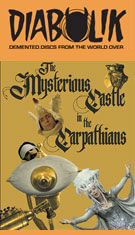
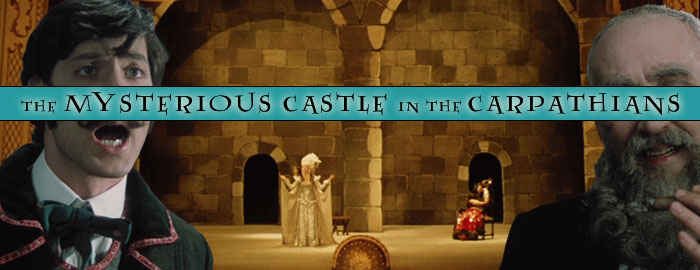
Color, 1981, 98 mins. 27 secs.
Directed by Oldřich Lipský
Starring Michal Dočolomanský, Evelyna Steimarová, Miloš Kopecký, Rudolf Hrušínský, Vlastimil Brodský Vlastimil Brodský, Jan Hartl
Deaf Crocodile (Blu-ray) (US RA HD), Bonton (DVD) (Czech R0 PAL),
The landscape of Czechoslovak 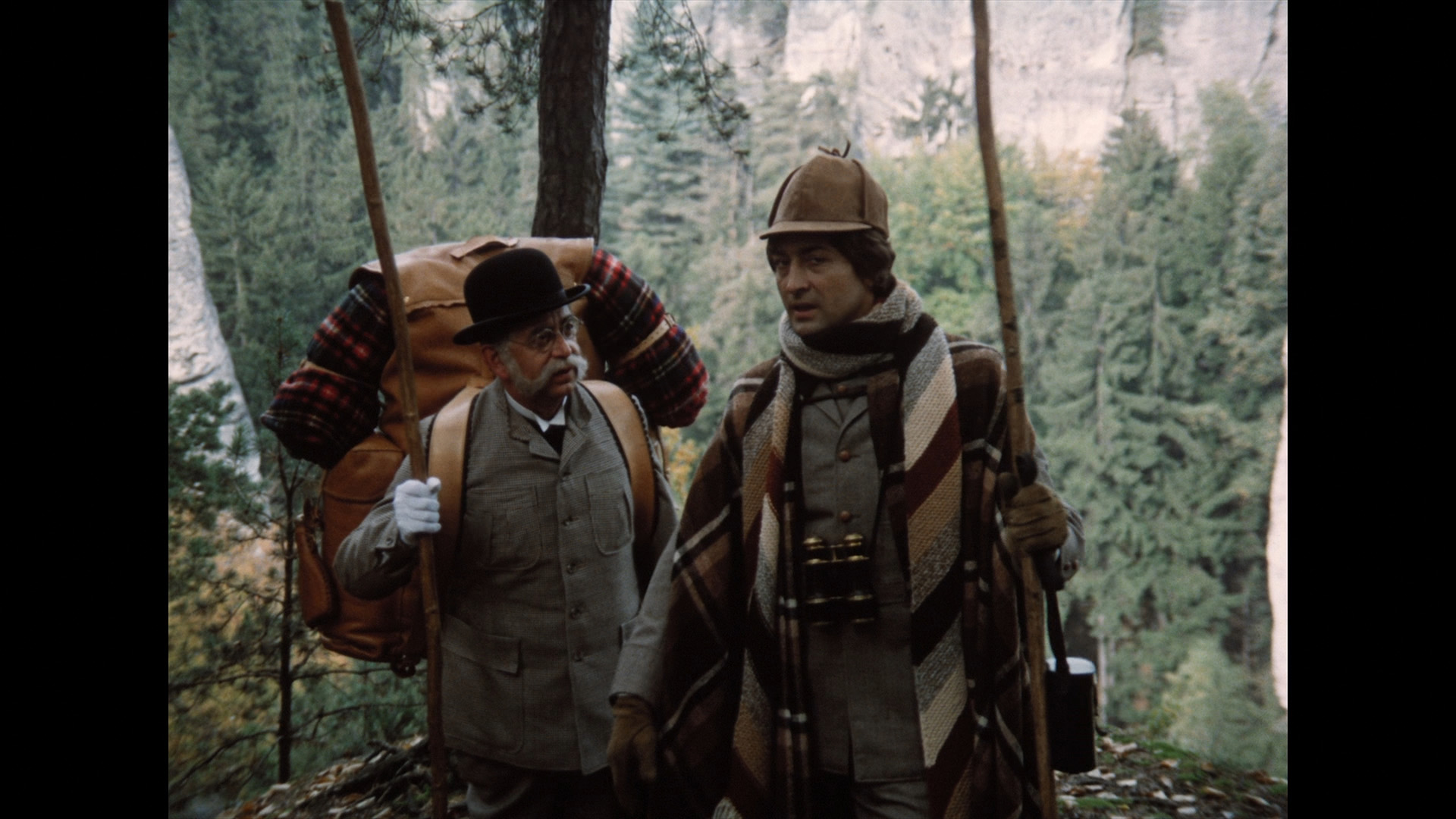 cinema is populated with highly unique and striking films from major
cinema is populated with highly unique and striking films from major 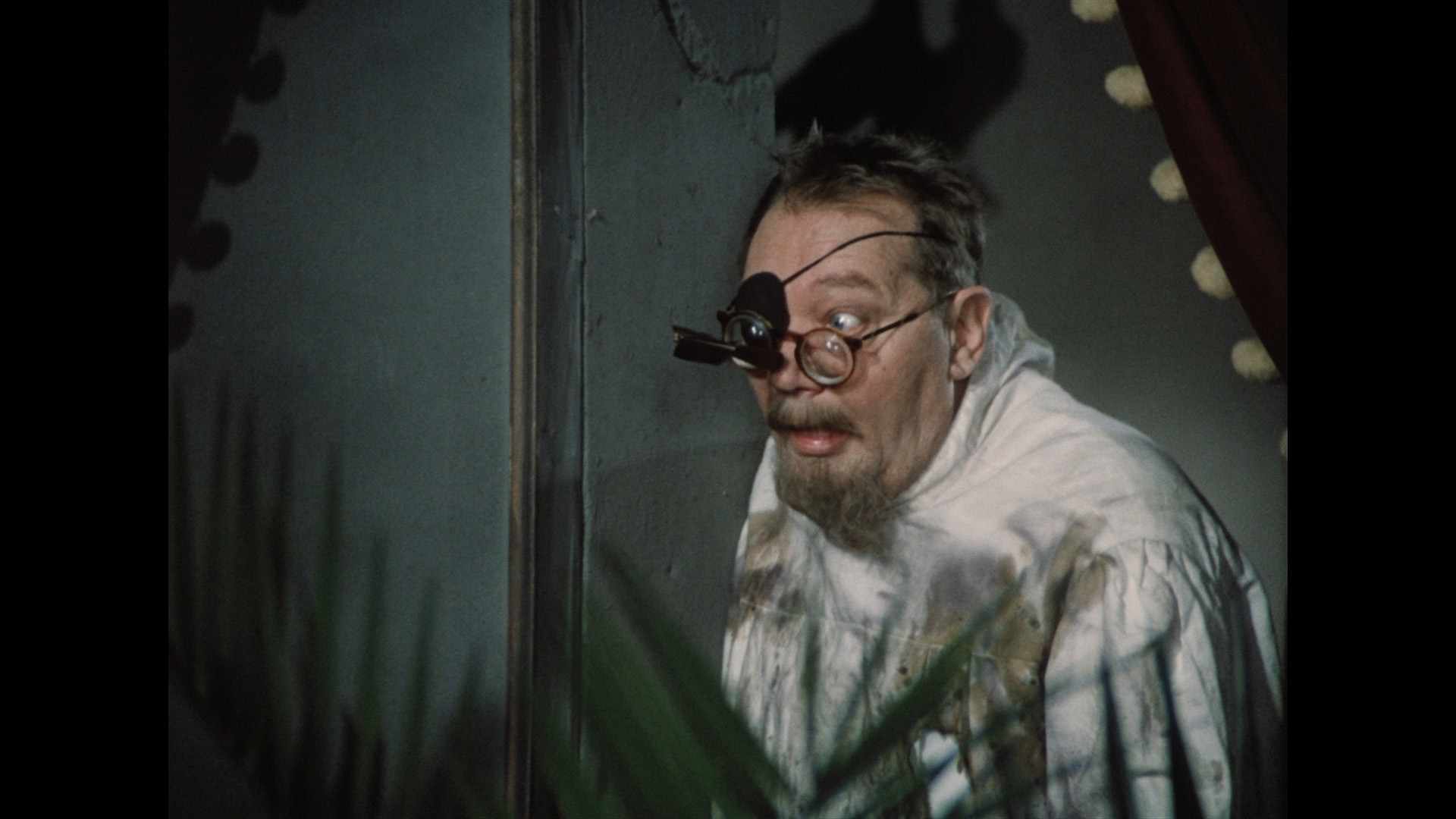 filmmakers, but none of them are quite like Oldřich Lipský, who made a particular splash in 1964 with the wild western spoof Lemonade Joe co-written with humorist and animator Jirí Brdečka. The duo reunited for two more films including 1978's quirky monster plant comedy Adele Hasn't Had Her Dinner Yet, while Lipský's other noteworthy, genre-bending solo efforts included I Killed Einstein, Gentlemen and Long Live Ghosts! The third and last of the Lipský-Brdečka films, The Mysterious Castle in the Carpathians, is a slap-happy adaptation of Jules Verne's 1897 novel The Carpathian Castle, loading tons of gags and surreal touches into a blend of sci-fi, Gothic horror, and general weirdness, all decked out with contraptions designed by animation legend Jan Svankmajer and a score by Luboš Fišer (Valerie and Her Week of Wonders).
filmmakers, but none of them are quite like Oldřich Lipský, who made a particular splash in 1964 with the wild western spoof Lemonade Joe co-written with humorist and animator Jirí Brdečka. The duo reunited for two more films including 1978's quirky monster plant comedy Adele Hasn't Had Her Dinner Yet, while Lipský's other noteworthy, genre-bending solo efforts included I Killed Einstein, Gentlemen and Long Live Ghosts! The third and last of the Lipský-Brdečka films, The Mysterious Castle in the Carpathians, is a slap-happy adaptation of Jules Verne's 1897 novel The Carpathian Castle, loading tons of gags and surreal touches into a blend of sci-fi, Gothic horror, and general weirdness, all decked out with contraptions designed by animation legend Jan Svankmajer and a score by Luboš Fišer (Valerie and Her Week of Wonders).
In 1897, the aristocratic, covert opera star Count Felix Teleke (Dočolomanský) is exploring the Carpathian forests in search of new, invigorating experiences, accompanied by the much older Ignác (Brodský). Along with some bizarre hands mounted in the trees, they come across Vilja (Hartl), the local forester who's now lingering near death beneath a shroud of leaves. 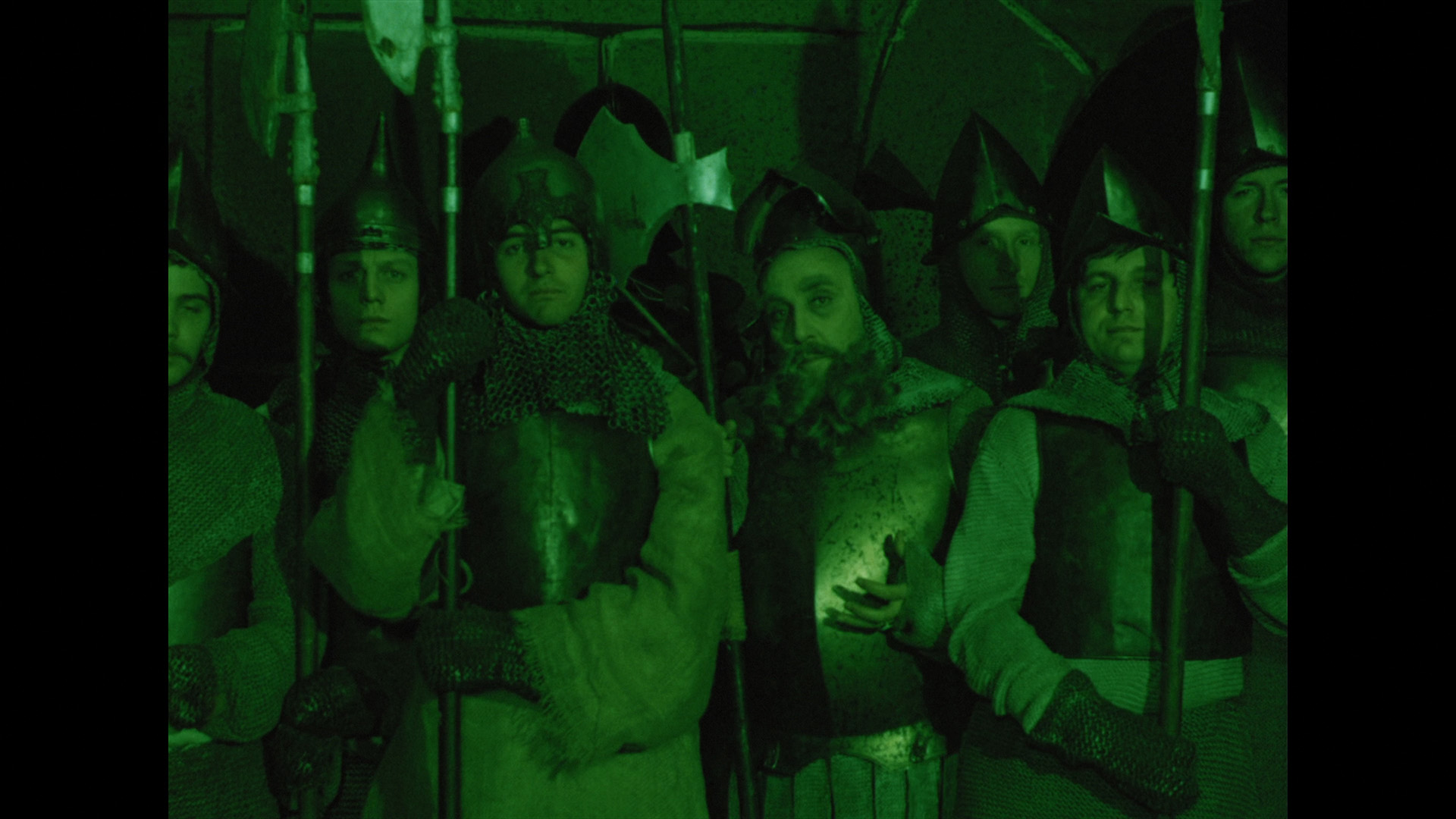 The duo bring him back to the nearest village where they contend with outrageous dialects, Slovak remedies, and plentiful sinister tales about the nearby "Devil's Castle." Felix becomes convinced that his lost love, the flamboyant opera singer Salsa Verde (Steimarová), is
The duo bring him back to the nearest village where they contend with outrageous dialects, Slovak remedies, and plentiful sinister tales about the nearby "Devil's Castle." Felix becomes convinced that his lost love, the flamboyant opera singer Salsa Verde (Steimarová), is 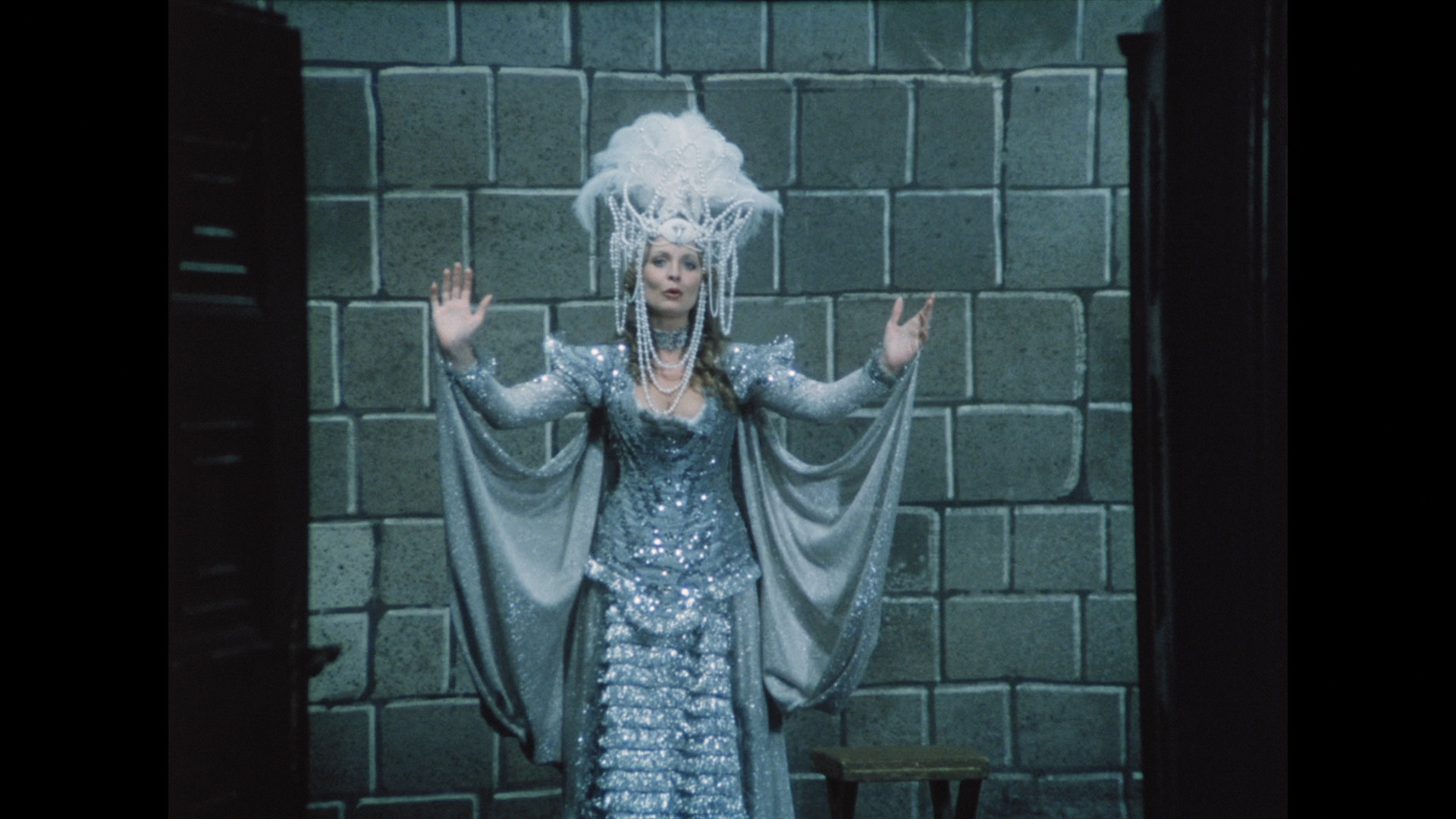 now being held at the ruined castle by the man who stole her away, the highly eccentric and scheming Baron Gorc (The Fabulous Baron Munchausen's Kopecký). With a reinvigorated but memory-impaired Vilja in tow, Felix fearlessly infiltrates the castle where he draws the attention of the Baron, who's surrounded by wild concoctions created by a mad scientist, Orfanik (Hrušínský), who's prone to shooting hundreds of rockets at the moon. The place is also filled with proto-TV and cinema devices that come into play, while Felix keeps bursting into glass-shattering arias at the drop of a hat.
now being held at the ruined castle by the man who stole her away, the highly eccentric and scheming Baron Gorc (The Fabulous Baron Munchausen's Kopecký). With a reinvigorated but memory-impaired Vilja in tow, Felix fearlessly infiltrates the castle where he draws the attention of the Baron, who's surrounded by wild concoctions created by a mad scientist, Orfanik (Hrušínský), who's prone to shooting hundreds of rockets at the moon. The place is also filled with proto-TV and cinema devices that come into play, while Felix keeps bursting into glass-shattering arias at the drop of a hat.
With its plentiful portrait gags, color-tinted flashbacks, striking media devices, and relentlessly strange flights of operatic fancy, The Mysterious Castle in the Carpathians somehow still manages to feel like a Verne tale, particularly as a descendant of the legendary ones by Karel Zemen. Somewhat confusingly, the novel (which has sometimes been cited as a potential influence on Bram Stoker's Dracula written a few years later) was also adapted as a 1975 made-for-TV Romanian production and, more famously, as another 1981 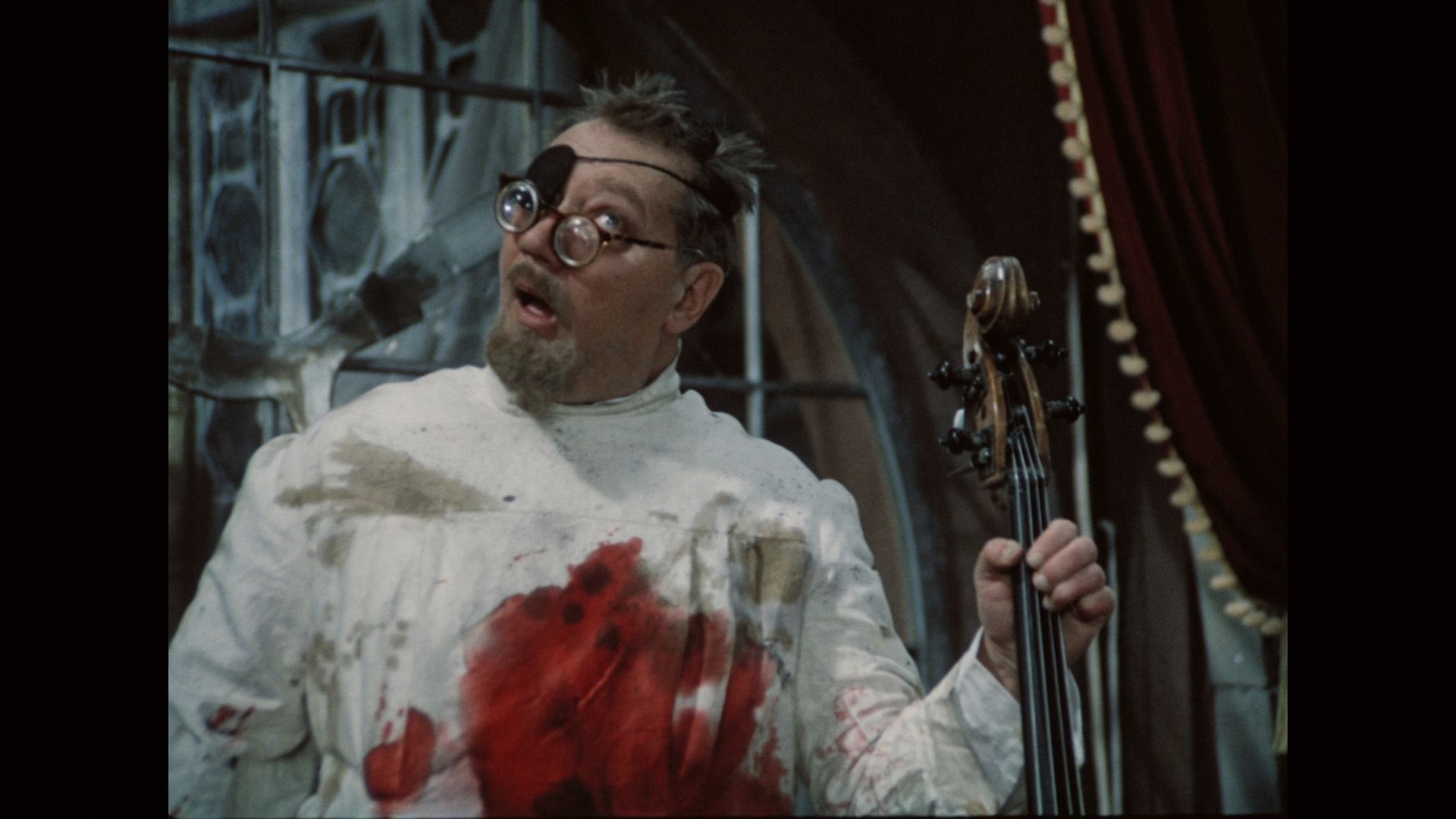 Romanian film by Stere Gulea as The Carpathian Castle. The film is quite aware of
Romanian film by Stere Gulea as The Carpathian Castle. The film is quite aware of 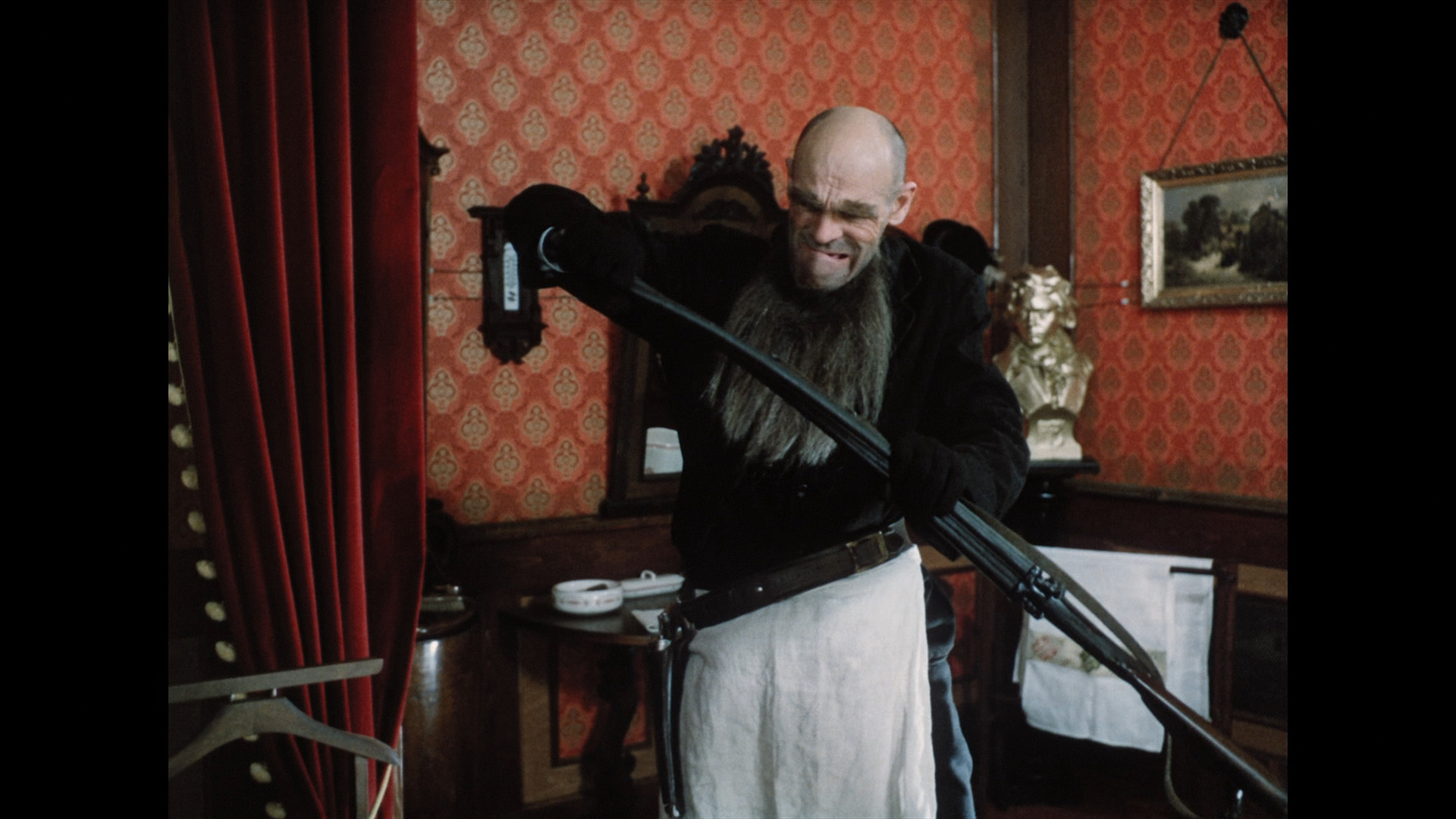 the book's status (even including a funny Dracula name drop at one point), but this is really its own beast with the comedy even extending to the dialogue clash between our hero and the locals who have a ridiculous, exaggerated manner of speaking that the English subtitles do their best to approximate with a sort of semi-Cockney approach.
the book's status (even including a funny Dracula name drop at one point), but this is really its own beast with the comedy even extending to the dialogue clash between our hero and the locals who have a ridiculous, exaggerated manner of speaking that the English subtitles do their best to approximate with a sort of semi-Cockney approach.
Though it's been released on Czech DVD a couple of times, this hasn't been the easiest film for English-speaking viewers to see until the Blu-ray edition from Deaf Crocodile. The new restoration (credited to Craig Rogers at the label) looks great, retaining the original 1.33:1 aspect ratio and boasting excellent details and colors throughout (with the tinted flashbacks in particular looking wild). The LPCM 2.0 Czech mono track is also in fine shape and features good English subtitles. The extras are all more or less devoted to Jirí Brdečka starting with his daughter, Tereza Brdečková, appearing for a new commentary with Czech film expert Irena Kovarova, returning after their track for Prague Nights for another in-depth look at a significant work of local fantastic cinema. It's a thorough and info-packed track, though a few bits can be trickier to hear. Then you get two very colorful, beautifully designed Brdečka short films: 1948's Vzducholoď a láska (Love and the Zeppelin) (8m45s) and 1980's Třináctá komnata prince Měděnce (Prince Copperslick aka Prince Měděnec’s Thirteenth Chamber) (9m39s), both presented in Czech with English subtitles (though they aren't dialogue heavy). A Zoom chat between Brdečková and Deaf Crocodile's Dennis Bartok (37m38s) is essentially a companion piece to the one on Prague Nights, covering highlights from her father's career, his famous collaborators, and lots more, with a particular focus on Lipský including how the pair met. Finally the feature-length 2017 documentary Universum Brdečka (88m19s) features Brdečková and other interview subjects surveying the writer, animator, and director's wide-ranging life and career including his collaborations with Lipský, Zeman, animator Jiří Trnka, and more, including tons of of family photos and artifacts. The package also comes with an insert featuring a new essay by Jonathan Owen on the film's relationship to Eastern and Central European cinema at large during the period.
Reviewed on March 16, 2024



 cinema is populated with highly unique and striking films from major
cinema is populated with highly unique and striking films from major  filmmakers, but none of them are quite like Oldřich Lipský, who made a particular splash in 1964 with the wild western spoof Lemonade Joe co-written with humorist and animator Jirí Brdečka. The duo reunited for two more films including 1978's quirky monster plant comedy Adele Hasn't Had Her Dinner Yet, while Lipský's other noteworthy, genre-bending solo efforts included I Killed Einstein, Gentlemen and Long Live Ghosts! The third and last of the Lipský-Brdečka films, The Mysterious Castle in the Carpathians, is a slap-happy adaptation of Jules Verne's 1897 novel The Carpathian Castle, loading tons of gags and surreal touches into a blend of sci-fi, Gothic horror, and general weirdness, all decked out with contraptions designed by animation legend Jan Svankmajer and a score by Luboš Fišer (Valerie and Her Week of Wonders).
filmmakers, but none of them are quite like Oldřich Lipský, who made a particular splash in 1964 with the wild western spoof Lemonade Joe co-written with humorist and animator Jirí Brdečka. The duo reunited for two more films including 1978's quirky monster plant comedy Adele Hasn't Had Her Dinner Yet, while Lipský's other noteworthy, genre-bending solo efforts included I Killed Einstein, Gentlemen and Long Live Ghosts! The third and last of the Lipský-Brdečka films, The Mysterious Castle in the Carpathians, is a slap-happy adaptation of Jules Verne's 1897 novel The Carpathian Castle, loading tons of gags and surreal touches into a blend of sci-fi, Gothic horror, and general weirdness, all decked out with contraptions designed by animation legend Jan Svankmajer and a score by Luboš Fišer (Valerie and Her Week of Wonders). The duo bring him back to the nearest village where they contend with outrageous dialects, Slovak remedies, and plentiful sinister tales about the nearby "Devil's Castle." Felix becomes convinced that his lost love, the flamboyant opera singer Salsa Verde (Steimarová), is
The duo bring him back to the nearest village where they contend with outrageous dialects, Slovak remedies, and plentiful sinister tales about the nearby "Devil's Castle." Felix becomes convinced that his lost love, the flamboyant opera singer Salsa Verde (Steimarová), is  now being held at the ruined castle by the man who stole her away, the highly eccentric and scheming Baron Gorc (The Fabulous Baron Munchausen's Kopecký). With a reinvigorated but memory-impaired Vilja in tow, Felix fearlessly infiltrates the castle where he draws the attention of the Baron, who's surrounded by wild concoctions created by a mad scientist, Orfanik (Hrušínský), who's prone to shooting hundreds of rockets at the moon. The place is also filled with proto-TV and cinema devices that come into play, while Felix keeps bursting into glass-shattering arias at the drop of a hat.
now being held at the ruined castle by the man who stole her away, the highly eccentric and scheming Baron Gorc (The Fabulous Baron Munchausen's Kopecký). With a reinvigorated but memory-impaired Vilja in tow, Felix fearlessly infiltrates the castle where he draws the attention of the Baron, who's surrounded by wild concoctions created by a mad scientist, Orfanik (Hrušínský), who's prone to shooting hundreds of rockets at the moon. The place is also filled with proto-TV and cinema devices that come into play, while Felix keeps bursting into glass-shattering arias at the drop of a hat.  Romanian film by Stere Gulea as The Carpathian Castle. The film is quite aware of
Romanian film by Stere Gulea as The Carpathian Castle. The film is quite aware of  the book's status (even including a funny Dracula name drop at one point), but this is really its own beast with the comedy even extending to the dialogue clash between our hero and the locals who have a ridiculous, exaggerated manner of speaking that the English subtitles do their best to approximate with a sort of semi-Cockney approach.
the book's status (even including a funny Dracula name drop at one point), but this is really its own beast with the comedy even extending to the dialogue clash between our hero and the locals who have a ridiculous, exaggerated manner of speaking that the English subtitles do their best to approximate with a sort of semi-Cockney approach.